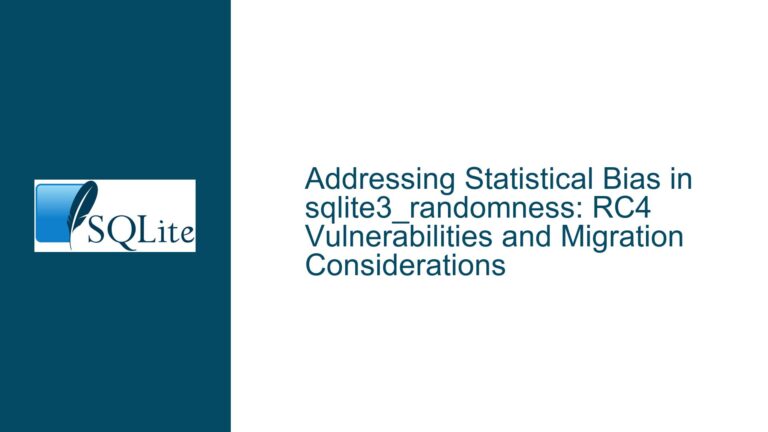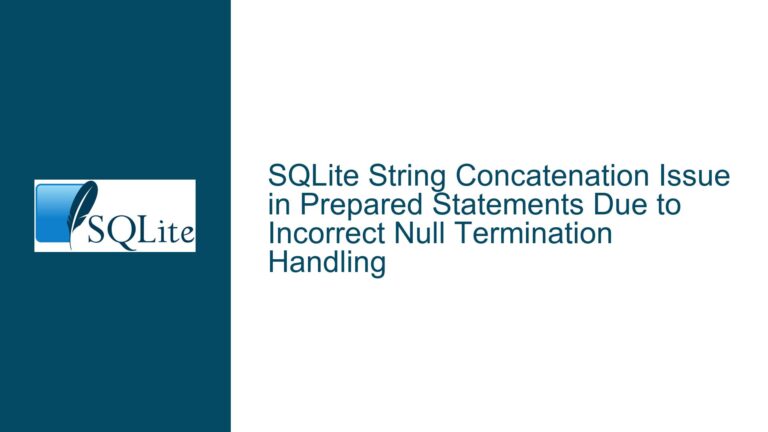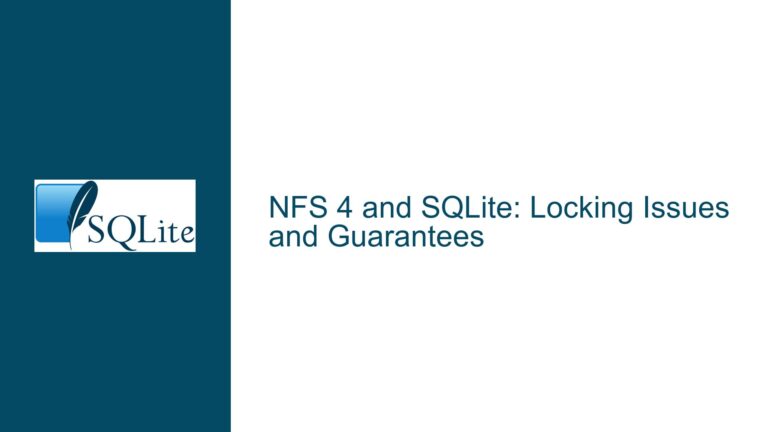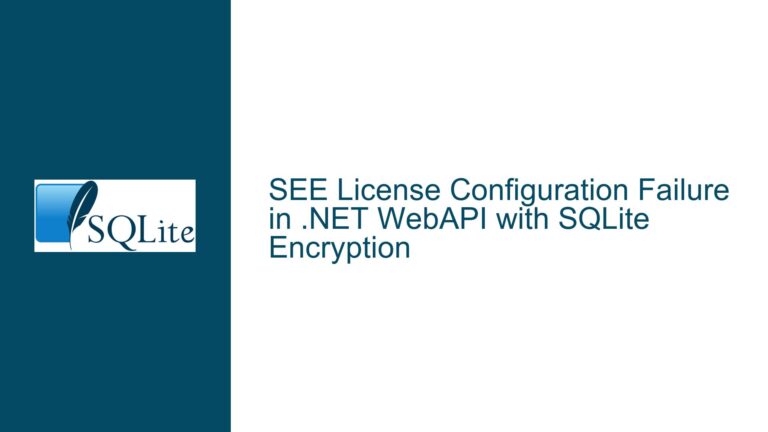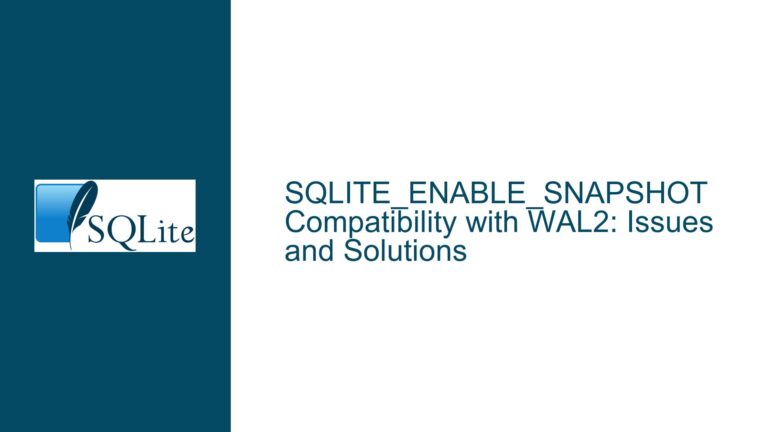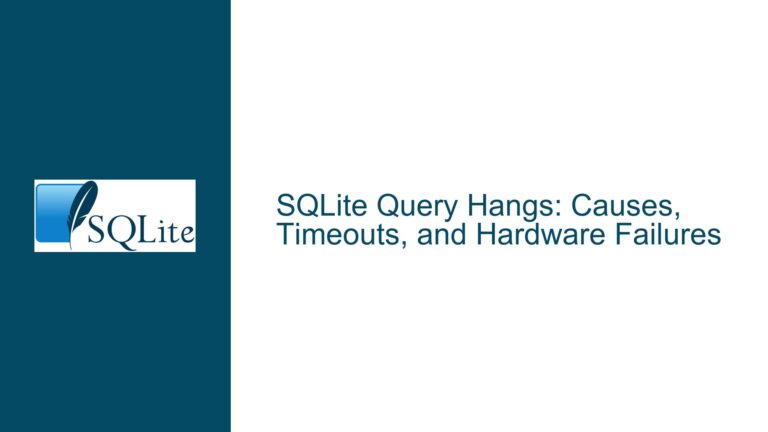Loading FileIO Extension in SQLite on macOS: Compilation Errors and DB Browser Integration
Issue Overview: FileIO Extension Compilation Challenges and Cross-Platform Compatibility
The core challenge involves compiling/using SQLite’s FileIO extension (providing readfile()/writefile() functions) within macOS environments while addressing version conflicts between SQLite core components and extension requirements. A developer attempts to write BLOB data directly to files using DB Browser for SQLite (DB4S) but encounters 3 critical roadblocks:
- Extension Compilation Failures: Attempts to compile fileio.c produce "undeclared identifier" errors related to SQLITE_VTAB_DIRECTONLY/SQLITE_DIRECTONLY flags
- DB Browser Workflow Limitations: Uncertainty about loading extensions through GUI vs terminal-based SQLite shell
- Cross-Platform Deployment Concerns: Questions about extension portability between macOS/Windows/Linux systems
This creates an unstable foundation where database operations requiring direct file I/O remain impossible until these compilation/configuration issues resolve. The problem space combines C compilation toolchain requirements with SQLite’s extension loading semantics and cross-platform binary compatibility constraints.
Possible Causes: Version Mismatches and Compilation Environment Configuration
1. SQLite Core vs Extension Version Divergence
The SQLITE_VTAB_DIRECTONLY flag was added in SQLite 3.30.0 (2019-10-04). Attempting to compile fileio.c against older SQLite headers (like macOS system-provided 3.12.1) creates undeclared identifier errors. This occurs when:
- Using outdated OS-bundled SQLite (macOS Catalina ships 3.28.0)
- Failing to coordinate SQLite amalgamation version with extension code
- Mixing extension code from newer SQLite versions with older core libraries
2. Incorrect Compilation Toolchain Setup
Compilation failures stem from missing/incomplete toolchain configuration:
- Header Path Conflicts: System headers (/usr/include/sqlite3.h) overriding intended versions
- Compiler Flag Omissions: Missing -I. to prioritize local SQLite amalgamation headers
- Architecture Mismatches: Building x86_64 extensions on ARM Macs without -target flags
- Dependency Chain Issues: sqlite3ext.h not in include path during compilation
3. Extension Loading Mechanism Misunderstandings
Persistent "no such function" errors arise from:
- Static vs Dynamic Linking: Assuming compiled extensions work across SQLite instances
- Load Order Dependencies: Attempting .load before enabling extensions via sqlite3_enable_load_extension()
- Path Resolution Failures: Relative vs absolute paths in .load commands
- Security Restrictions: macOS System Integrity Protection blocking unsigned extensions
4. Cross-Platform Binary Compatibility Assumptions
Expecting single .dylib/.so/.dll to work across OSes ignores:
- ABI Differences: Data type sizes/alignments between platforms
- Dependency Chains: Extension reliance on OS-specific shared libraries
- File Format Variations: SQLite page size/encoding defaults differing
- Compiler Toolchain Variance: Clang vs GCC code generation idiosyncrasies
Troubleshooting Steps: Version Alignment and Cross-Platform Deployment Strategy
Phase 1: Establish Version-Coherent Build Environment
Step 1.1: Audit SQLite Versions
Terminal:
# System SQLite version
/usr/bin/sqlite3 --version
# DB4S-linked version
/Applications/DB\ Browser\ for\ SQLite.app/Contents/Frameworks/sqlite3.framework/Versions/C/sqlite3 --version
# Homebrew SQLite (if installed)
/usr/local/opt/sqlite/bin/sqlite3 --version
Step 1.2: Obtain Matching Source Code
Download SQLite amalgamation matching DB4S’s SQLite version:
# Example for SQLite 3.36.0
wget https://sqlite.org/2021/sqlite-amalgamation-3360000.zip
unzip sqlite-amalgamation-3360000.zip
cd sqlite-amalgamation-3360000
Step 1.3: Verify fileio.c Compatibility
Check fileio.c’s modification date against SQLite version history. If newer than target SQLite version, obtain historical extension code:
wget https://sqlite.org/src/raw/ext/misc/fileio.c?name=54e7f21c9f0730d7 -O fileio.c
Phase 2: Compile Extension with Version-Coherent Toolchain
Step 2.1: Set Compilation Environment
Terminal:
export SQLITE_AMALGAMATION_DIR=/path/to/sqlite-amalgamation-3360000
export CC=clang
export CFLAGS="-fPIC -dynamiclib -I$SQLITE_AMALGAMATION_DIR"
Step 2.2: Execute Platform-Targeted Compilation
macOS Intel:
clang $CFLAGS $SQLITE_AMALGAMATION_DIR/fileio.c -o fileio.dylib
macOS ARM:
clang $CFLAGS -target arm64-apple-macos11 $SQLITE_AMALGAMATION_DIR/fileio.c -o fileio.dylib
Step 2.3: Validate Compiled Artifact
# Check for expected symbols
nm -gU fileio.dylib | grep sqlite3_extension_init
# Verify loadability
/Applications/DB\ Browser\ for\ SQLite.app/Contents/Frameworks/sqlite3.framework/Versions/C/sqlite3
sqlite> .load ./fileio.dylib
sqlite> SELECT writefile('test.txt', 'Hello World');
Phase 3: Configure DB Browser for Extension Loading
Step 3.1: Enable Extension Support in DB4S
- Launch DB4S
- Open database
- Tools > Load Extension
- Navigate to fileio.dylib
- Verify functions:
SELECT readfile('test.txt'); -- Should return blob content
Step 3.2: Automate Extension Loading
Create ~/.sqliterc:
.load /full/path/to/fileio.dylib
Step 3.3: Handle macOS Security Exceptions
- System Preferences > Security & Privacy
- General tab
- Click "Allow Anyway" for sqlite3/fileio.dylib
- Retry loading after approval
Phase 4: Cross-Platform Deployment Tactics
Step 4.1: Build Matrix for Target Platforms
| Platform | Compiler Command |
|---|---|
| Windows x64 | cl /Iamalgamation /LD fileio.c sqlite3.lib |
| Linux x64 | gcc -fPIC -shared fileio.c -o fileio.so |
| macOS ARM | clang -target arm64-apple-macos12 -fPIC -dynamiclib fileio.c -o fileio.dylib |
Step 4.2: Package Extension with Version Metadata
Create extensions.json:
{
"fileio": {
"version": "2021-06-05",
"platforms": {
"darwin-arm64": "fileio.arm64.dylib",
"darwin-x64": "fileio.x64.dylib",
"win32-x64": "fileio.x64.dll",
"linux-x64": "fileio.x64.so"
},
"sha256sums": {
"fileio.arm64.dylib": "a1b2c3...",
"fileio.x64.dylib": "d4e5f6...",
"fileio.x64.dll": "g7h8i9...",
"fileio.x64.so": "j0k1l2..."
}
}
}
Step 4.3: Implement Runtime Loading Logic
Python example:
import platform
import sqlite3
def load_fileio_extension(conn):
system = platform.system().lower()
machine = platform.machine().lower()
ext_path = f"extensions/fileio.{system}-{machine}"
if system == 'darwin':
ext_path += '.dylib'
elif system == 'windows':
ext_path += '.dll'
else:
ext_path += '.so'
conn.enable_load_extension(True)
conn.load_extension(ext_path)
Step 4.4: Validate Cross-Platform Behavior
Test matrix:
| Test Case | Expected Result |
|---|---|
| writefile() on macOS ARM | Creates file with 0644 permissions |
| readfile() on Windows | Handles backslash path normalization |
| writefile() cross-filesystem (APFS→NTFS) | Maintains BLOB integrity |
| Concurrent access via extension | Obeys SQLITE_BUSY semantics |
Phase 5: Maintenance and Monitoring
Step 5.1: Implement Version Check Triggers
SQL:
CREATE TABLE extension_versions (
name TEXT PRIMARY KEY,
expected_version TEXT,
detected_version TEXT,
last_checked DATETIME
);
INSERT INTO extension_versions VALUES (
'fileio',
(SELECT value FROM pragma_compile_options WHERE compile_options LIKE 'SQLITE_VERSION%'),
(SELECT sqlite3_extension_report('fileio')),
CURRENT_TIMESTAMP
);
Step 5.2: Automate Build Pipelines
.github/workflows/build-extensions.yml:
name: Build SQLite Extensions
on:
push:
paths:
- 'extensions/fileio.c'
jobs:
build:
runs-on: ${{ matrix.os }}
strategy:
matrix:
os: [macos-latest, windows-latest, ubuntu-latest]
steps:
- uses: actions/checkout@v2
- name: Build Extension
run: |
case ${{ runner.os }} in
macOS)
clang -fPIC -dynamiclib -I. fileio.c -o fileio.dylib
;;
Windows)
cl /I. /LD fileio.c sqlite3.lib
;;
Linux)
gcc -fPIC -shared fileio.c -o fileio.so
;;
esac
- uses: actions/upload-artifact@v2
with:
name: fileio-${{ runner.os }}
path: |
fileio.*
Step 5.3: Monitor Extension Compatibility
Implement automated testing:
import unittest
import sqlite3
class TestFileIOExtension(unittest.TestCase):
@classmethod
def setUpClass(cls):
cls.conn = sqlite3.connect(':memory:')
load_fileio_extension(cls.conn)
def test_write_read_cycle(self):
self.conn.execute("SELECT writefile('test.bin', randomblob(1048576))")
result = self.conn.execute("SELECT hex(sha3(readfile('test.bin')))").fetchone()
self.assertEqual(len(result), 64)
if __name__ == '__main__':
unittest.main()
Final Implementation Checklist
Version Alignment
- SQLite core version matches extension code requirements
- Header files synchronized with linked library versions
- DB4S compiled against compatible SQLite version
Compilation Integrity
- -I. flag prioritizes local SQLite amalgamation headers
- Target architecture flags match deployment environment
- SQLITE_VTAB_DIRECTONLY present in used SQLite version
Deployment Packaging
- Platform-specific binaries built with clean toolchains
- Cryptographic hashes verify binary integrity
- Loader logic selects correct binary per environment
Runtime Validation
- Extension functions appear in sqlite_master
- File I/O operations respect OS permissions
- Cross-platform tests confirm BLOB consistency
Monitoring Infrastructure
- Automated version compatibility checks
- Build pipeline produces auditable artifacts
- Unit tests cover critical extension functionality
This comprehensive approach transforms fragile, manual extension setup into a robust cross-platform solution. By strictly controlling version alignment, automating build/test processes, and implementing runtime validation, developers gain reliable file I/O capabilities within SQLite across macOS, Windows, and Linux environments.

